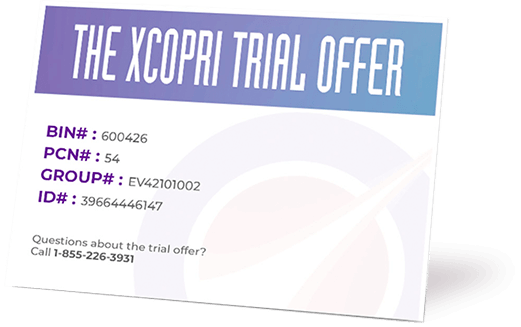FAQs
FREQUENTLY ASKED QUESTIONS (FAQs) ABOUT XCOPRI
Here are some frequently asked questions (FAQs) that people have about XCOPRI® (cenobamate tablets) CV. Always remember that your doctors should be your main source of treatment information. Having an open and honest discussion with them will help you get the most from your treatment.
BASIC INFORMATION
ABOUT XCOPRI
WHAT IS XCOPRI® (cenobamate tablets) CV?
XCOPRI® (cenobamate tabets) CV is a prescription medicine taken by mouth once daily and used to treat partial-onset seizures in adults.
CAN I GET XCOPRI AT MY LOCAL PHARMACY?
XCOPRI® (cenobamate tablets) CV can be purchased at any retail pharmacy. Please allow your pharmacy several days to order XCOPRI.
HOW DO I GET STARTED WITH XCOPRI?
First, talk with your doctor and ask if XCOPRI® (cenobamate tablets) CV might be a good fit for you.
Next, follow the link below to download the XCOPRI $0 Trial Offer.* Save the offer to your phone or print it and bring it with you to the pharmacy with your first month’s prescription of XCOPRI (12.5/25 mg).

*Terms and Conditions apply.
IS THERE ANY FINANCIAL SUPPORT FOR XCOPRI?
If you or a family member are prescribed XCOPRI® (cenobamate tablets) CV, SK Life Science Navigator may help you:
- Find out if XCOPRI is covered by your/their insurance
- Begin treatment with XCOPRI even if insurance delays coverage, doesn’t provide coverage, or you or a family member don’t have insurance
- Process and ship prescriptions as soon as the same day
- Receive refill and appointment reminders by text message, if requested
Eligibility requirements apply.
TAKING XCOPRI
HOW DO I TAKE ONCE-DAILY XCOPRI?

XCOPRI is taken once
daily by mouth
XCOPRI may be taken
with or without food
XCOPRI can be taken whole
or crushed
With once-daily XCOPRI® (cenobamate tablets) CV, you and your doctor can decide what time of day works best for you. It’s important to choose a time that you can stick to and take your medicine about the same time every day.
WHAT IS THE DAILY DOSAGE OF XCOPRI?
The recommended starting dosage is 12.5 mg once daily. You will start on the lowest dosage and your doctor will increase your dosage slowly over time until you reach one that’s right for you. The recommended maintenance dosage is 200 mg once daily. In some cases, your doctor may increase your dosage if needed. However, your daily dosage should not exceed 400 mg.
HOW FAST DOES XCOPRI WORK?
Everyone is different. If you and your doctor decide to add XCOPRI to your treatment for partial-onset seizures, you will start on the lowest dosage and your doctor will slowly increase your dosage over time until you reach one that’s right for you.
TAKING XCOPRI WITH
OTHER MEDICATIONS
WHAT IF I AM ALREADY ON A TREATMENT FOR MY PARTIAL-ONSET SEIZURES?

Patients participating in the clinical trials with XCOPRI® (cenobamate tablets) CV were also on additional medications.
If you are already taking medication for your partial-onset seizures, talk with your doctor about what adding XCOPRI could mean to you.
CAN I USE XCOPRI WITH MEDICINE FOR ANXIETY OR DEPRESSION?
XCOPRI® (cenobamate tablets) CV may affect the way other medicines work, and other medicines may affect how XCOPRI works. Do not start or stop other medicines without talking with your doctor. Tell doctors about all the medicines you take, including prescription and over-the-counter medicines, vitamins, and herbal supplements.
DOES XCOPRI AFFECT BIRTH CONTROL?
XCOPRI® (cenobamate tablets) CV may cause your birth control medicine to be less effective. Talk with your doctor about the best birth control method to use.
XCOPRI SIDE EFFECTS
WHAT SIDE EFFECTS CAN OCCUR WHEN TAKING XCOPRI?
Side effects may include:
- Feeling sleepy and tired
- Dizziness
- Double vision
- Headache
If you experience any side effects that bother you, be sure to discuss them with your doctor.
It is important to pay attention to any changes, especially sudden changes, in mood, behaviors, thoughts, or feelings, and report any to your doctor. XCOPRI can cause serious or life-threatening side effects.
Call your doctor or 911 right away if you experience reactions such as a skin rash, hives, fever, swelling of the face, eyes, lips, or tongue.
These are not all the possible side effects of XCOPRI. A full description of side effects can be found in the Medication Guide and Important Safety Information.
Before starting once-daily XCOPRI it’s important to let your doctor know if you have been diagnosed with a genetic problem that affects your heart (called Familial Short QT syndrome). Do not take XCOPRI if you have Familial Short QT syndrome.
UNDERSTANDING EPILEPSY
WHAT IS EPILEPSY?
Epilepsy is a chronic condition of the brain that causes repeated seizures, and is usually defined as 2 or more seizures with no obvious cause at least 24 hours apart. Epilepsy is quite common, affecting at least 3 million adults in the United States.
IS EPILEPSY GENETIC?
The risk of developing epilepsy as a result of genetics may be possible. Although other causes of epilepsy can include:
- Head trauma, perhaps as the result of a car accident or some other traumatic injury
- Brain conditions. Strokes are the leading cause of epilepsy in adults older than age 35
- Prenatal injury such as oxygen deficiencies or poor nutrition
- Infectious diseases. For example, meningitis and viral encephalitis

WHAT TYPE OF DOCTOR TREATS EPILEPSY?
Epilepsy is treated by doctors who specialize in conditions of the brain or epilepsy such as a neurologist or epileptologist.
Need help connecting with
a specialist in your area?
LEARNING ABOUT SEIZURES
WHAT IS A SEIZURE?
A seizure is caused by a sudden surge of electrical activity in the brain. Seizures can last anywhere from a few seconds to a few minutes.
WHAT ARE THE DIFFERENT TYPES OF SEIZURES?
There are 2 main categories of seizures:
- Generalized seizures affect both sides of the brain from the start of the seizure.
- Partial-onset, or focal seizures begin in 1 area of the brain. About 60% of people with epilepsy have this type of seizure.

WHAT CAN CAUSE OR TRIGGER A SEIZURE?
Different people can have very different triggers. Here are some that are common:
- Missed medication is one of the main reasons for breakthrough seizures in people whose seizures were under control. It’s important to take seizure medication as prescribed by a doctor
- Lack of sleep can lead to more seizures and increase their intensity and duration
- Stress can trigger seizures in people with epilepsy
- Alcohol-related seizures usually occur when alcohol is consumed in large quantities over a short period of time or during withdrawals, which can be up to 72 hours after drinking.
- Among women of child-bearing age who have epilepsy, almost half experience increased seizures around their period
- Not eating well, low blood sugar
- Specific foods, excess caffeine, or other products that may aggravate seizures
- Use of certain medications
- Fevers or other Illnesses
- Flashing bright lights or patterns
WHAT SHOULD YOU DO WHEN SOMEONE IS HAVING A SEIZURE?
Some basic things you can do for someone having a seizure are:
- Turn them on their side if they are not aware/alert
- Keep their airways clear
- Loosen tight clothes around their neck
- Put something small and soft under their head
- If their seizure lasts more than 5 minutes call 911
PARTIAL-ONSET
(FOCAL) SEIZURES
WHAT ARE PARTIAL-ONSET (FOCAL) SEIZURES?
A partial-onset or focal seizure is the most common type of seizure in many people living with epilepsy. About 60% of people living with epilepsy experience this type of seizure. Partial-onset seizures begin in 1 part of the brain. They generally last from a few seconds to a few minutes.
During a simple-partial, or focal-aware seizure, a person is alert and aware of what is going on around them.
During a complex-partial, or focal, impaired-awareness seizure, a person may appear confused, dazed, and unaware of their surroundings.
WHAT ARE THE SIGNS AND SYMPTOMS OF PARTIAL-ONSET SEIZURES?
Sometimes the first symptom of a seizure is an aura, a sensation that feels different. It serves as a warning that a seizure is about to occur and may remind you to find a safe place until the seizure passes. Symptoms can vary depending on which lobe, or area, of the brain is affected and the functions that area controls: the frontal lobe, the temporal lobe, the parietal lobe, and the occipital lobe.
GLOSSARY: KEY TERMS EXPLAINED
An advocate is a person who speaks or writes in support of another person or cause.
Epilepsy is a condition of the brain that causes a person to have seizures.
An epileptologist is a neurologist who specializes in epilepsy.
Epilepsy medicine is medication used to treat different types of seizures. It may be called an antiepileptic drug or AED and is also referred to as an antiseizure medication or ASM.
A neurologist is a doctor who specializes in treating conditions of the nervous system.
Side effects are unwanted symptoms caused by medical treatment.
Triggers are events that may occur fairly consistently before seizures and more often than by chance. See What can cause or trigger a seizure? above for more information.
Hear from real XCOPRI patients
about their fight against epilepsy.























































































































































